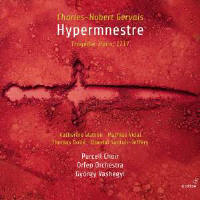Texte paru dans: / Appeared in: Code-barres / Barcode : 8424562240070 |
|
|
Outil de traduction (Très approximatif) |
|
|
Reviewer: Richard Lawrence
If
Stephen Fry is planning a third volume of Greek legends, to follow Mythos and
Heroes, he might balk at including the grim story of Danaos, king of Argos, and
his daughter Hypermnestra. In the mid- to late 18th century, Metastasio’s
libretto on the subject (under the title Ipermestra, without the ‘n’) was to be
set by several composers, from Hasse to Paisiello. It was a toned-down version,
with the inevitable happy ending; but the violent original resurfaced, in all
its horror, in Salieri’s Les Danaïdes.
Charles-Hubert Gervais (1671-1744) belongs to that generation of opera composers
including Charpentier, Campra and Destouches – all neglected till recently – who
were active between the death of Lully and the emergence of Rameau. Hypermnestre,
his third tragédie en musique, was premiered at the Paris Opéra in November
1716, to a libretto by Joseph de La Font. It was given again the following year,
with a new last act to words by Simon-Joseph Pellegrin (later to be the
librettist for Rameau’s Hippolyte et Aricie); there were four more revivals up
to 1766, after which the opera disappeared. That this recording from Budapest
came about is due to a considerable amount of editorial work – including the
provision of inner parts for the chorus and orchestra – by the Centre de Musique
Baroque de Versailles, whose director, Benoît Dratwicki, provides an informative
booklet note.
The opera begins with a Prologue: but this is no sycophantic Lullian extolling
of the unnamed Hero, the Sun King. Louis XIV had died the year before and France
was now led by a regent, Philippe d’Orléans, who employed Gervais as his maître
de musique. La Font’s libretto – highly thought of at the time – sets the
Prologue by the Nile, the pyramids in the distance. Supported by the river
itself, the Egyptians hold games in honour of Isis; the goddess appears,
proposing to restore peace by ordering the union of Hypermnestre, daughter of
Égyptus, and Lyncée, son of Danaüs.
The action then moves to Argos, whither Danaüs had fled after being expelled by
his brother Égyptus (who doesn’t appear in the opera). He intends to marry his
50 daughters to the 50 sons of Égyptus; but in seizing the throne he killed the
king, Gélanor, whose ghost tells him that he will be assassinated by one of his
sonsin-law. To avert this, Danaüs instructs his daughters to murder the 50
husbands. Hypermnestre alone refuses, but she is torn between love for Lyncée
and the oath she unwittingly swore to Danaüs.
Her father gets his comeuppance, of course, and Lyncée gets both bride and
throne. But Danaüs is an interesting character, wracked by guilt and remorse as
well as being determined to avoid his punishment. Thomas Dolié is gripping in
the monologue after his confrontation with the ghost – a solemn Philippe-Nicolas
Martin, with stabbing repeated notes in the orchestra. Danaüs has something in
common, perhaps, with Claudius in Hamlet. Mathias Vidal’s Lyncée is believably
horror-struck when Hypermnestre reveals the plot and tries to kill herself (more
stabbing notes in the orchestra). Katherine Watson could sound a bit more
engaged when thunder announces the murder of her new brothersin-law (‘Dieux! ô
Dieux! Quelle barbarie!’ they sing, offstage), but on the whole she is well into
the part, with some nice runs on ‘volez’ (disc 1, track 37). There’s excellent
support from Santon-Jeffery, Camelino and Mars.
The performance
follows the first revival, with some additions from 1728 and – by François Rebel
– 1765; and the recording includes the two quite different versions of Act 5,
from 1717 and 1716. György Vashegyi keeps it all together with style. There’s an
attractive minor-key passacaille for flute and strings. It may be that we will
have to wait a long time before seeing this very accomplished work on stage; but
someone could make a beautiful suite out of the manifold dances. |
|




